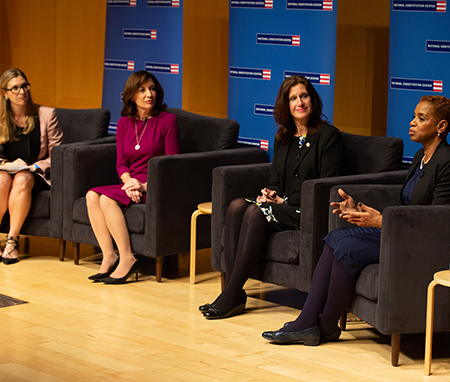What are the leading proposals to combat election disinformation and are they consistent with the First Amendment? Richard L. Hasen, leading election law expert and author of Cheap Speech: How Disinformation Poisons Our Politics—and How to Cure It; Sarah Isgur, staff writer at The Dispatch and co-host of the legal podcast Advisory Opinions; and Catherine Ross, free speech expert and author of A Right to Lie? Presidents, Other Liars, and the First Amendment discuss. Jeffrey Rosen, president and CEO of the National Constitution Center, moderates.
Video
Podcast
Participants
Richard L. Hasen is Chancellor’s Professor of Law and Political Science at the University of California, Irvine and Co-Director of the University’s Fair Elections and Free Speech Center. He served as founding co-editor of the Election Law Journal and as a CNN Election Law Analyst in 2020. Hasen is the author of over 100 articles and many books, including his newest book is Cheap Speech: How Disinformation Poisons Our Politics—and How to Cure It. He is a faculty member of the UC Irvine Jack W. Peltason Center for the Study of Democracy and an elected member of the American Law Institute.
Sarah Isgur is a staff writer at The Dispatch, where she also co-hosts the legal podcast, Advisory Opinions. She also serves as an analyst for ABC News and as a contributing editor to Politico Magazine. Prior to joining The Dispatch, Isgur worked in the Department of Justice as the director of the Office of Public Affairs and senior counsel to the Deputy Attorney General. She also previously worked on three Republican presidential campaigns.
Catherine Ross is the Lyle T. Alverson Professor of Law at the George Washington University Law School. She is the author of many books, including Lessons in Censorship: How Schools and Courts Subvert Students' First Amendment Rights, and most recently, Right to Lie? Presidents, Other Liars, and the First Amendment. In addition to being an expert on the First Amendment, she also specializes in family law and is an elected fellow at the American Bar Association.
Jeffrey Rosen is the president and CEO of the National Constitution Center, a nonpartisan nonprofit organization devoted to educating the public about the U.S. Constitution. Rosen is also professor of law at The George Washington University Law School and a contributing editor of The Atlantic.
Additional Resources
- Richard L. Hasen, Cheap Speech: How Disinformation Poisons Our Politics—and How to Cure It
- Catherine Ross, A Right to Lie?: Presidents, Other Liars, and the First Amendment
- United States v. Alvarez (2012)
- Minnesota Voters Alliance v. Mansky (2018)
- Sarah Isgur, The Dispatch, "Will RoJo Stay or Will He Go?"
- Richard L. Hasen, The Washington Post, “Facebook and Twitter could let Trump back online. But he’s still a danger.”
- RealClearPolitics, "Sarah Isgur: 'People On Both Sides Are Not Ready To Accept The Results Of The Next Election'"
- Catherine Ross, The Hill, "There's no such thing as 'absolute immunity' for former presidents"
- Joseph O'Sullivan, The Seattle Times, "Bill that would make it a crime for some to lie about election results dies in WA Senate"
- Richard L. Hasen, The New York Times, "How to Keep the Rising Tide of Fake News From Drowning Our Democracy"
- Richard L. Hasen, Slate, "How Supreme Court Radicalism Could Threaten Democracy Itself"
- New York Times v. Sullivan (1964)
- Abrams v. United States (1919)
- Americans for Prosperity v. Bonta (2021)
- Thomas Jefferson, Letter to William Roscoe (1820)
- 303 Creative LLC v. Elenis (2022)
- Section 230 of the United States Communications Decency Act (1996)
TRANSCRIPT
This transcript may not be in its final form, accuracy may vary, and it may be updated or revised in the future.
Stay Connected and Learn More
Continue the conversation on Facebook and Twitter using @ConstitutionCtr.
Sign up to receive Constitution Weekly, our email roundup of constitutional news and debate, at bit.ly/constitutionweekly.
Please subscribe to Live at the National Constitution Center and our companion podcast We the People on Apple Podcasts, Stitcher, or your favorite podcast app.
To watch National Constitution Center Town Hall programs live, check out our schedule of upcoming programs. Register through Zoom to ask your constitutional questions in the Q&A or watch live on YouTube.








